GLOBAL HEALTH WORKING GROUP FOR THE 2016 G7 SUMMIT
2014–2016
As the host country of the G7 Summit in 2016, Japan had the unique opportunity to set the tone for how global health priorities will be addressed in the summit agenda and help articulate how they will be formulated within the post-development framework. In order to capitalize on this opportunity and on the growing momentum surrounding universal health coverage (UHC) as an increasingly important global priority, the Japan Center for International Exchange (JCIE), in partnership with the University of Tokyo, organized a Global Health Working Group (GHWG) under the supervision of JCIE’s Executive Committee on Global Health and Human Security to formulate policy proposals that could guide summit talks on global health and health security.
Japan, as the world’s most rapidly aging society, can provide valuable lessons—good and bad—on the timing for introducing and reforming UHC systems that are sustainable through demographic transition and in various economic circumstances. At the global level, the recent Ebola outbreak raised questions about the effectiveness of current global health governance and reminded the international community of the importance of health system strengthening.
Against such a backdrop, JCIE’s Global Health Working Group published its proposals to the G7 Summit in the May 21, 2016 issue of the Lancet, building on findings from previous research (the Lancet Special Series on Japan, and the Japan-World Bank Partnership Program on Universal Health Coverage), as well as from seven study groups tasked with exploring relevant themes.
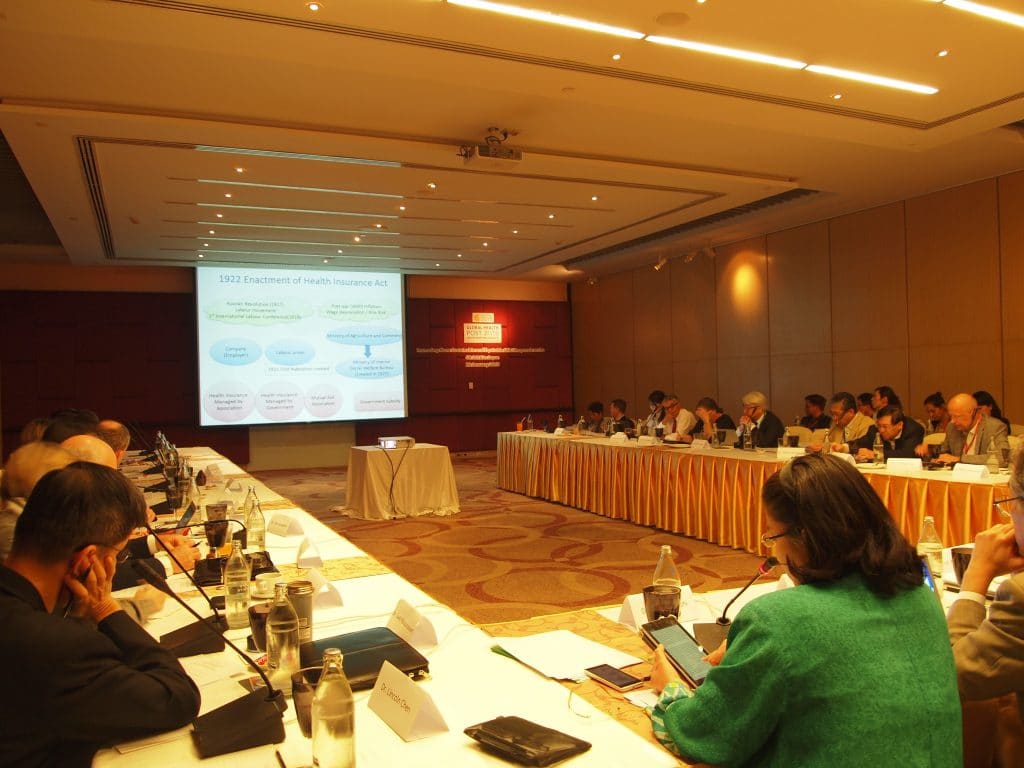
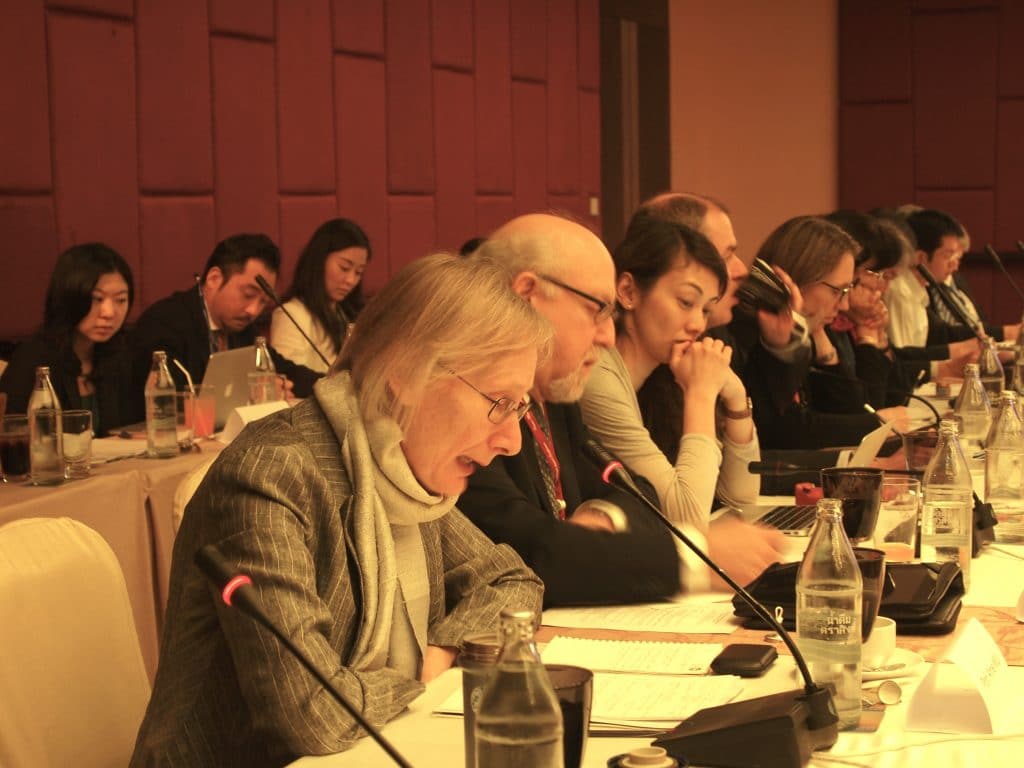
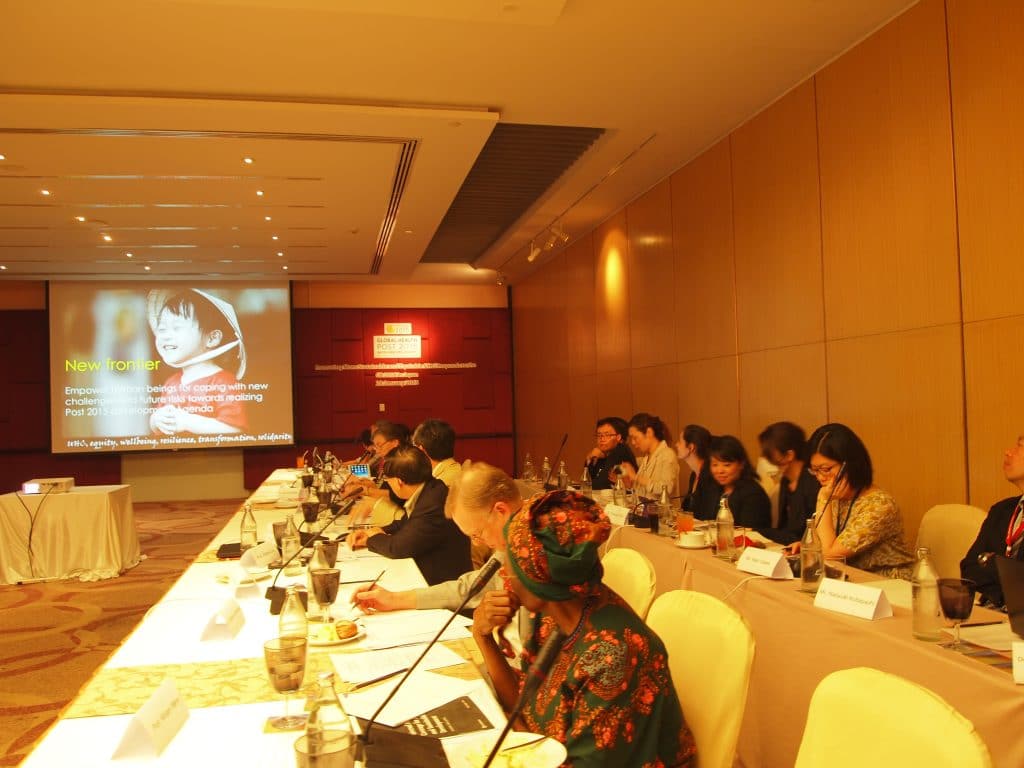
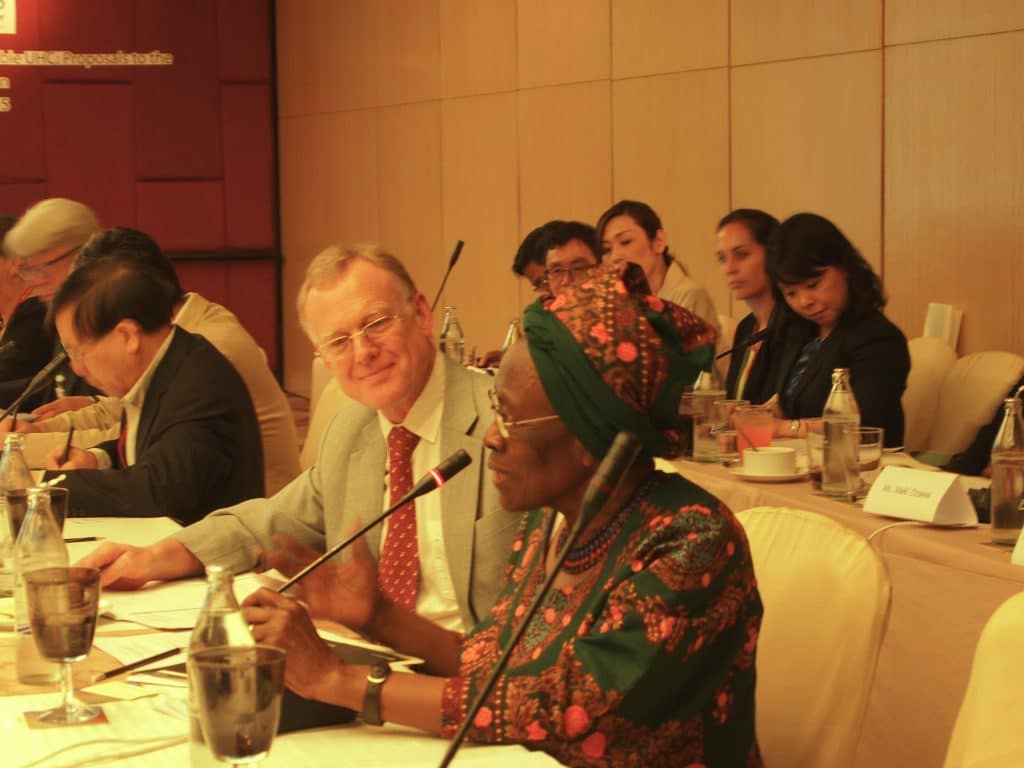
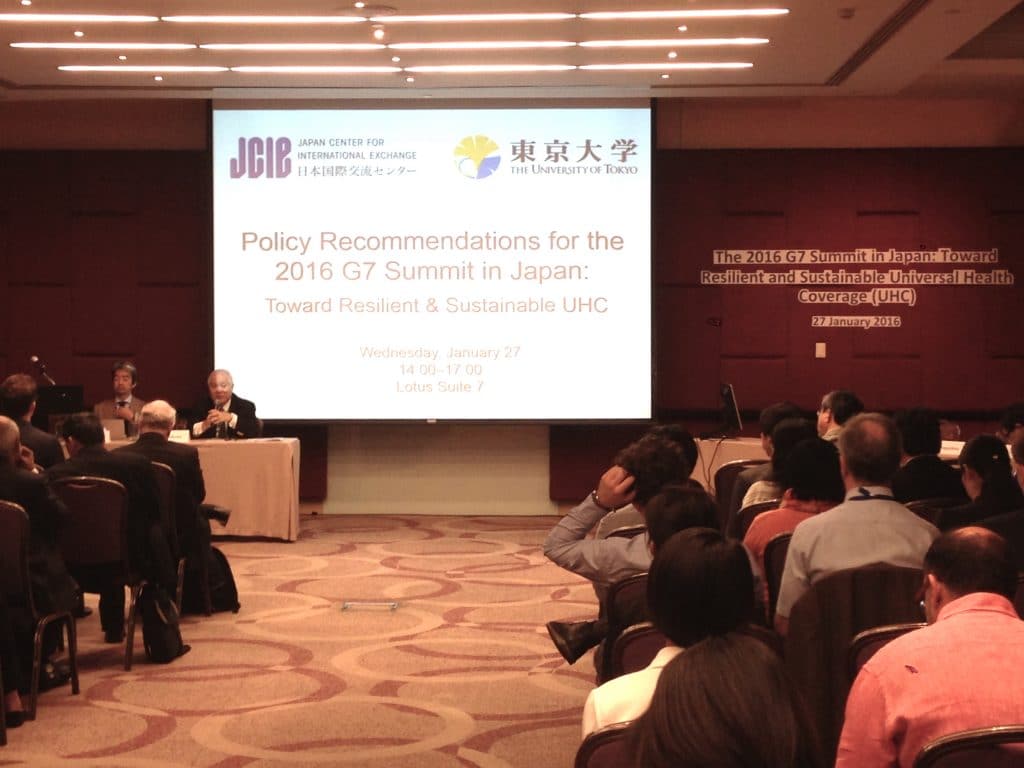
Group 1
Sustainability of UHC in the Context of Demographic Changes, Industrial Structure, and Epidemics
Group 1 will propose actions in global health to the upcoming G7 Summit, synthesizing the findings of the other six groups—including lessons learned from Japan’s experience with UHC—to comprehensively assess the relevance of human security in the SDG era, the ability of UHC to contribute to human security, and health security concerns including pandemic preparedness and antimicrobial resistance.
Group 2
Social and Economic Impact of UHC
Group 2 will analyze the socioeconomic impact of policy measures implemented to achieve UHC. The group will identify key practical lessons that developing countries should take into account when designing and implementing UHC. Data from Japan’s first 10 years sustaining its UHC system will help to analyze the impact of income redistribution on reducing inequality.Group 3
Three E’s of UHC in Japan: Equity, Effectiveness, and Efficiency
Group 3 will evaluate aspects of equity, effectiveness, and efficiency of service delivery in Japan, including the resilience of health systems to exogenous shocks such as the 2008 global financial crisis and the 2011 Tohoku disaster on health-care delivery, the efficacy of the primary healthcare system, and the integration of medical, nursing, and community-based care. These will be used to assess the prospects for sustaining UHC despite Japan’s rapidly aging population.
Group 4
Pragmatic Methods and Lessons Learned from Japan’s Experience Sustaining UHC
Group 4 will start by reviewing global frameworks that have guided the development of the UHC concept to date and examine the mechanisms and institutional capacity through which UHC functions at the policy level as well as its practical applications on the ground. Based on the findings developed by group 5, they will highlight the measures Japan is currently taking to adapt and sustain its UHC system.Group 5
Japan’s New Directions in Global Health Cooperation
In Group 5, the Japan International Cooperation Agency (JICA), the National Institute for Public Health (NIPH), and the National Center for Global Health and Medicine (NCGM) are collaborating on the launch of an operational framework for Japan’s role in supporting UHC and global health within the post-development agenda.Group 6
Challenges in Global Health Governance
Based on lessons from the responses to the Ebola outbreak, group 6 will assess the global health governance landscape in order to identify major challenges that require new thinking and reform in the governance structure. authors will analyze recent trends and propose areas of reform needed to respond to changing needs and priorities in global health and health security, with a focus on the role of Japan and the G7.
Group 7
Better Mechanism for Global Health Innovation
Despite a persistent need for innovation in dealing with infectious disease, pharmaceutical companies are reluctant to develop new products low in financial incentive. Most of the funding for new drugs and products comes from governments, with the G7 countries accounting for over 80%. Group 7 will identify the current inefficiencies in the funding ecosystem among G7 states and propose a mechanism that could provide information on the global portfolio in a timely manner to each independent funder. By doing so, it aims to improve the prioritization of investments through the identification of pipeline gaps and better-informed funder decision-making.KEIZO TAKEMI | Senior Fellow, Japan Center for International Exchange (JCIE); Member, House of Councillors [Chair] |
KENJI SHIBUYA | Professor and Chair, Department of Global Health Policy, Graduate School of Medicine, University of Tokyo [Director] |
HIDEKI HASHIMOTO | Professor, Department of Health and Social Behavior, School of Public Health, University of Tokyo [Deputy Director] |
HIDECHIKA AKASHI | Director, Bureau of International Medical Cooperation, National Center for Global Health and Medicine (NCGM) |
REIKO HAYASHI | Director of International Research and Cooperation, National Institute of Population and Social Security Research |
TOSHIAKI IIZUKA | Professor, Graduate School of Economics, University of Tokyo |
YASUSHI KATSUMA | Dean, International Studies Program, Graduate School of Asia-Pacific Studies (GSAPS); Director, Institute of Asia-Pacific Studies, Waseda University |
TOSHIRO KUMAKAWA | Chief Researcher, Department of Health and Welfare Services, National Institute of Public Health (NIPH), Japan |
CHIAKI MIYOSHI | Director, Bureau of International Medical Cooperation, NCGM |
HARUKO NOGUCHI | Professor, Waseda Institute for Advanced Study, Waseda University |
TAKASHI OSHIO | Professor, Institute of Economic Research, Hitotsubashi University |
HIDEAKI SHIROYAMA | Dean and Professor, Graduate School of Public Policy; Graduate Schools of Law and Politics, University of Tokyo |
BT SLINGSBY | Executive Director and CEO, Global Health Innovative Technology Fund (GHIT) |
TOMOHIKO SUGISHITA | Senior Advisor, Japan International Cooperation Agency (JICA) |
HIDEO YASUNAGA | Professor, Department of Clinical Epidemiology and Health Economics, School of Public Health, University of Tokyo |
SATOKO HORII | Senior Researcher, Department of International Health and Collaboration, NIPH, Japan |
SAYAKO KANAMORI | Director Research/Chief Health Officer, Japan Institute for Global Health (JIGH) |
KEI KATSUNO | Director, Investment Strategy & Development, GHIT |
NAOKI KONDO | Associate Professor, Department of Health and Social Behavior, School of Public Health, University of Tokyo |
SHUNSUKE MABUCHI | Health Specialist, World Bank Group |
MAKIKO MATSUO | Project Assistant Professor, Graduate School of Public Policy / Policy Alternative Research Institute, University of Tokyo |
YUKI MURAKAMI | Health Economist; Directorate for Employment, Labour and Social Affairs; Organisation for Economic Co-operation and Development (OECD) |
TOMOKO ONO | Assistant Director, Health Division 4, Health Group 2, Human Development Department, JICA |
CHIAKI SATO | Associate Professor, Faculty of Law, Aoyama Gakuin University |
IKUO TAKIZAWA | Deputy Director-General, Group Director for Health 1, Human Development Department, JICA |
BUMPEI TAMAMURA | Director, Branding Development, GHIT |
KAYO YASUDA | Associate Professor, Faculty of Urban Liberal Arts, School of Law and Politics, Tokyo Metropolitan University |
Young bureaucrats from the Ministry of Health, Labour and Welfare | |
Government of Japan (Cabinet Office; Ministry of Health, Labour and Welfare; Ministry of Foreign Affairs; and Ministry of Finance)
Japan International Cooperation Agency
National Institute of Public Health
National Center for Global Health and Medicine
Related Activities
- GHWG Recommendations Published in the Lancet—”Protecting Human Security: Proposals for the G7 Ise-Shima Summit in Japan” (May 21, 2016)
- Prince Mahidol Award Conference 2016 Side Meeting on “Policy Recommendations for the 2016 G7 Summit in Japan: Toward Resilient and Sustainable Universal Health Coverage (UHC)” (Bangkok, January 27, 2016)
- Roundtable Discussion on GHWG Draft Recommendations to the G7 and Implementation (Tokyo, December 17, 2015)
- Prince Mahidol Award Conference 2015 Side Meeting on “Promoting More Sustainable and Equitable UHC: Proposals to the G7 2016 in Japan” (Bangkok, January 28, 2015)
